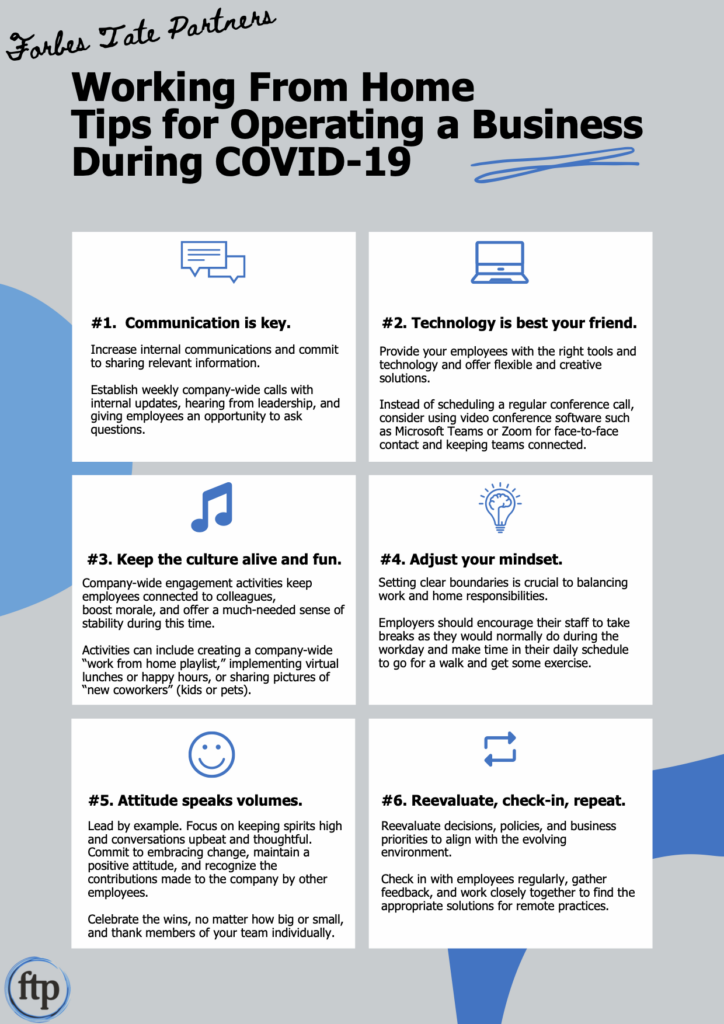Over the last six weeks, employers have experienced unprecedented challenges as they shift their businesses to a virtual environment, direct employees to work remotely, and adhere to social distancing recommendations.
In late February, as the Centers for Disease Control issued a warning regarding the novel coronavirus (COVID-19) and urged the American public to begin working from home and reduce in-person contact, it became clear employers were in unchartered territory. While some companies introduced telework policies long before the pandemic surfaced in the United States, others were forced to quickly adapt to the reality — a new experience for some — of working remotely. According to the Modern Workplace 2019 report conducted by Condeco Software, 41% of employers offer some form of remote work, and this trend will likely increase to limit the spread of the virus. During this time, employers must step up and adjust their day-to-day operations to ensure the safety of their employees, limit the interruption of business operations, and develop systems to accommodate their workforce. Like many employers, we find ourselves reexamining our own internal operations and leaning on best practices during this time. Here are six tips for businesses and employees as they navigate working from home.
- Communication is key. One of the most critical services employers can provide during this time is transparent and consistent communication to their employees. Increasing internal communications can enhance trust, ease anxiety, and minimize fears among employees. A recent survey found employees trust their employers more than government or news outlets when it comes to information about COVID-19. Companies committed to sharing relevant information — including ways the company is keeping employees safe and transitioning the business during this time — will create better workplaces. Employees seek transparency during a crisis and want to hear from their managers and leadership. Employers should be honest about what they know and what they don’t and “navigate conversations with care.” Establishing weekly company-wide calls with internal updates, hearing from leadership, and giving employees an opportunity to ask questions keeps the connection personal and engaging.
- Technology is your best friend. As traditional office settings are temporarily replaced with kitchen counters and home offices, our reliance on technology and collaboration tools will be put to the test. This means supporting employees with different needs and providing them with the right tools and technology to continue being a successful contributor in the workplace. Employees should address their technology needs (e.g., training, tools, equipment) in real-time with their managers. Employers with flexible and creative solutions to technology barriers will help alleviate frustrations among employees and support productivity and performance. Instead of scheduling a regular conference call, consider using video conference software such as Microsoft Teams or Zoom for face-to-face contact and to keep teams connected.
- Keep the culture alive and fun. Transitioning to remote work can significantly impact the culture of a company, especially if remote work was previously limited or non-existent. Company-wide engagement activities keep employees connected to colleagues, boost morale, and offer a much-needed sense of stability during this time. Activities can include creating a company-wide “work from home playlist,” implementing virtual lunches or happy hours, or sharing pictures of “new coworkers” (kids or pets). Although a virtual activity cannot truly replace the in-person human connection, it provides employees with an opportunity to socialize and keep each other engaged while having some fun.

- Adjust your mindset. Many employees are dealing with stressful everyday challenges on top of managing their workload: teaching kids at home, taking care of elderly parents, sharing spaces and resources (e.g., Internet), checking in virtually with family and friends, and dealing with a variety of anxieties related to finances and staying healthy. Navigating this new work backdrop will require employers and employees to adjust their mindset and expectations around capacity and productivity. The well-being of employees should be an employer’s biggest priority. In fact, having empathy for an employee’s situation is likely to increase that employee’s productivity, as work-related stress decreases. Also, setting clear boundaries is crucial to balancing work and home responsibilities; one of the biggest struggles employees have with working remotely is unplugging after work. Employers should encourage their staff to take breaks as they would normally do during the workday and make time in their daily schedule to go for a walk and get some exercise.
- Attitude speaks volumes. As author Nancy F. Koehn wrote, leaders are made and forged in crisis. Employees are leaning on their leaders, who must project confidence and strength to encourage positivity without dismissing or downplaying the reality of the situation. The best bosses lead by example — those focused on keeping spirits high and conversations upbeat and thoughtful will have the same impact on others. Commit to embracing change, maintain a positive attitude, and recognize the contributions made to the company by other employees. Celebrate the wins, no matter how big or small, and thank members of your team individually.
- Reevaluate, check in, repeat. Given that it may not be business as usual for some time, employers should be willing to reevaluate decisions, policies, and business priorities to align with the evolving environment. Check in with employees regularly, gather feedback, and work closely together to find the appropriate solutions for remote practices. Employees should also use this time to check in with their managers and colleagues to be transparent about their work needs, challenges, and goals. Remember, this is a crisis we are all facing together.
So, throughout the remainder of this health crisis, try to take advantage of this unique opportunity to strengthen your work family. The way you choose to conduct yourself during this time will impact what kind of leader and colleague you want to be once the pandemic is over. For now, embrace this era of change as best as you can, and remember the U.S. business community is resilient — we will come out of this challenge stronger than ever.

